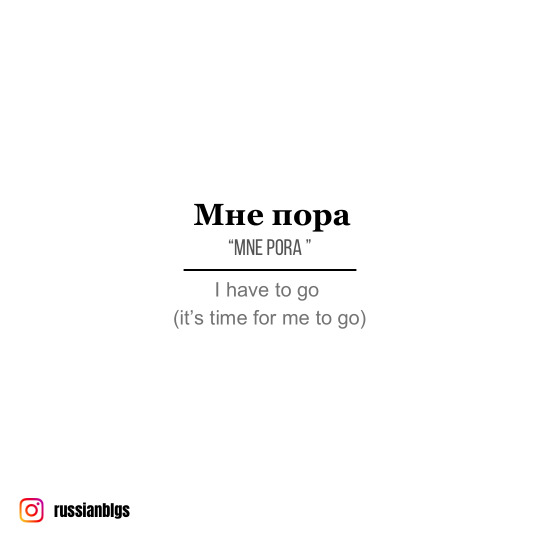Text
Before - До (do)
After - После (posle)
During - Во время (vo vremya)
Now - Сейчас (seychas)
Later - Позже (pozhe)
Earlier - Ранее (ranee)
Soon - Скоро (skoro)
Yesterday - Вчера (vchera)
Today - Сегодня (segodnya)
Tomorrow - Завтра (zavtra)
Next - Следующий (sleduyushchiy)
Previous - Предыдущий (predyushchiy)
Before - До (do)
Я пришел до твоего прихода. (I arrived before you.)
After - После (posle)
Он ушел после завершения работы. (He left after finishing work.)
During - Во время (vo vremya)
Я смотрел фильм во время ужина. (I watched a movie during dinner.)
Now - Сейчас (seychas)
Сейчас я читаю книгу. (I am reading a book now.)
Later - Позже (pozhe)
Мы пойдем в магазин позже. (We will go to the store later.)
Earlier - Ранее (ranee)
Она пришла ранее, чем мы ожидали. (She arrived earlier than we expected.)
Soon - Скоро (skoro)
Скоро начнется дождь. (It will rain soon.)
Yesterday - Вчера (vchera)
Вчера был замечательный день. (Yesterday was a wonderful day.)
Today - Сегодня (segodnya)
Сегодня у меня много дел. (I have a lot to do today.)
Tomorrow - Завтра (zavtra)
Завтра мы идем на пикник. (We are going on a picnic tomorrow.)
Next - Следующий (sleduyushchiy)
В следующий раз мы сделаем это лучше. (We will do it better next time.)
Previous - Предыдущий (predyushchiy)
Предыдущий урок был сложным. (The previous lesson was difficult.)
6 notes
·
View notes
Text
Я слушаю музыку каждый день. (I listen to music every day.)
Я слушаю радио по дороге на работу. (I listen to the radio on my way to work.)
Он не слушает мои советы. (He doesn't listen to my advice.)
Мы часто слушаем музыку вечером. (We often listen to music in the evening.)
Я люблю слушать аудиокниги перед сном. (I enjoy listening to audiobooks before bedtime.)
Дети слушают музыку в своих наушниках. (The children are listening to music on their headphones.)
7 notes
·
View notes
Text
слушать" (slushat') To listen
Я слушаю (Ya slushayu) - I listen
Т�� слушаешь (Ty slushayesh') - You listen (informal singular)
Он/Она слушает (On/Ona slushaet) - He/She listens
Мы слушаем (My slushaem) - We listen
Вы слушаете (Vy slushayete) - You listen (formal singular and plural)
Они слушают (Oni slushayut) - They listen
Examples:
Я слушаю музыку. (I listen to music.)
Ты слушаешь радио. (You listen to the radio.)
Он слушает аудиокниги. (He listens to audiobooks.)
Мы слушаем концерт. (We are listening to the concert.)
Вы слушаете лекцию. (You are listening to the lecture.)
Они слушают звуки природы. (They listen to the sounds of nature.)
17 notes
·
View notes
Text

3 notes
·
View notes
Text
Beginner Russian: If you are a beginner, you should be learning like a child, drop that ego. You didn’t start off in your native language with skills like a 20 year old native.
Prompt: Напиши предложение о своей любимой игрушке. (Write a sentence about your favorite toy.)
Example: Моя любимая игрушка - мячик. ⚽️ (My favorite toy is a ball.)
Pronunciation: Moya lyubimaya igrushka - myachik.
Translation: My favorite toy is a ball.
2 notes
·
View notes
Text
Here's a short writing practice for beginner Russian:
Prompt: Напиши предложение о своём любимом животном. (Write a sentence about your favorite animal.)
Example: Моё любимое животное - кот. 🐱 (My favorite animal is a cat.)
Pronunciation: Moye lyubimoye zhivotnoye - kot.
Translation: My favorite animal is a cat.
Don’t be lazy, write it down. Say it out loud. ✌️✨
#spoiled girlfriend#black femininity#femininity#hupergamy#hypergamy#pretty privilege#leveling up#learn russian#russian#russian vocabulary
6 notes
·
View notes
Text
Russian Verbs
Иметь- To have (present tense)
Я имею
Он/она/оно имеет
Мы имеем
Вы имеете
Они имеют
Examples:
Я имею много друзей - I have many friends
Ты имеешь талант - you have talent
Он имеет большой дом - He has a big house
Мы имеем общие интересы - We have common interest
Иметь" (imet') is a more general verb that can be used to indicate possession or ownership of tangible and intangible things. It is often used when talking about possessing something more permanent or long-term.
Есть" (est') is used when referring to the immediate availability or presence of something. It is commonly used to talk about temporary possession, current circumstances, or the availability of something at a given moment
Я (Ya) - есть (yest')
Ты (Ty) - есть (yest')
Он/Она/Оно (On/Ona/Ono) - есть (yest')
Мы (My) - есть (yest')
Вы (Vy) - есть (yest')
Они (Oni) - есть (yest')
Examples:
Я есть учитель. (Ya yest' uchitel') - I am a teacher.
Ты есть студент. (Ty yest' student) - You are a student.
Он есть доктор. (On yest' doktor) - He is a doctor.
Мы есть друзья. (My yest' druz'ya) - We are friends.
Вы есть гости. (Vy yest' gosti) - You are guests.
Они есть ученики. (Oni yest' ucheniki) - They are students.
In many cases, both "иметь" and "есть" can be used interchangeably to express possession. However, using "есть" often emphasizes the presence or availability of something in the present moment, while "иметь" is more neutral and can refer to both present and long-term possession.
#learn russian#russian#russian vocabulary#russian langblr#russian language#spoiled girlfriend#black femininity#femininity#hupergamy#hypergamy#pretty privilege#level up#leveling up
63 notes
·
View notes